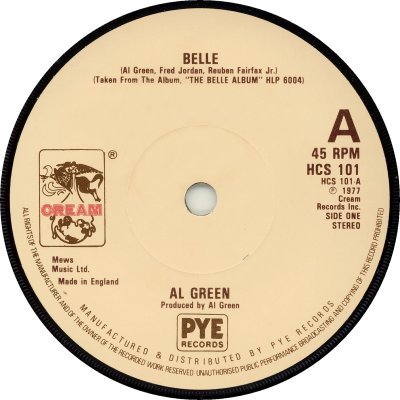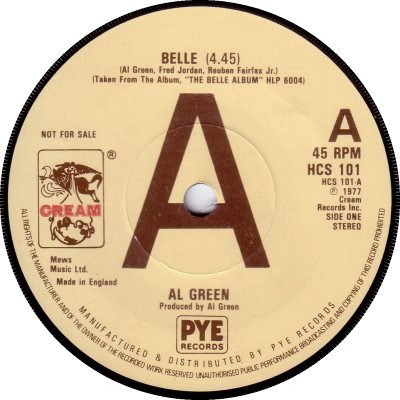

American, out of Los Angeles. 'Billboard' of the 30th of October 1970 broke the news that Al Bennett, late of Liberty / United Artists (q.v. both), was setting up a new label, Cream, as part of his Bennett Enterprises company. It was intended to be aimed at the Contemporary Pop market. A couple of weeks later 'BB' of the 14th of November added some details: Bennett, who had been with Liberty for twelve years and had been president of Liberty / UA when he left, was to head the new company, while his son Wayne dealt with A&R. The emphasis on Contemporary Pop was repeated, and it was said that there were no immediate plans to release Country or Soul product. The intention was to issue a blend of in-house productions and ones sourced from independent producers. The first single would be released soon, and overseas licensees were being sought, preferably one company which would handle Cream worldwide. An advert for the company and for its first single, 'She's A Lady' by Ray Kennedy, duly appeared, in 'BB' of the 12th of December.
'Record Retailer' of the 16th of January 1971 reported that the Bennetts were looking for a three- to five-year licensing deal for Cream in the UK. The search was successful, and 'BB' of the 13th of February was able to state that EMI were to launch Cream in the UK. For whatever reason, however, not much resulted. A solitary Cream single, Henry Shed's versions of 'Bend Me Shape Me' and 'Save The Last Dance For Me', surfaced on EMI's Stateside label early in 1972 (SS-2198; 1/72), with an originating credit to Cream Records, but that was the lot. Things were apparently not going well back in the USA either, and this first incarnation of Cream put out its final single in August 1972.
Al Bennett spent almost four years out of the record business. Then in March 1976 he joined forces with a company called Midget Productions, the executives of that company taking up positions with a re-formed Cream Records. Two months later, in May, the first single from the new Cream was released ('BB', 12th March 1977). The 'Inside Track' column of 'BB' of the 18th of December 1976 speculated about Cream possibly making a big comeback in the new year, with Bennett reportedly intending to go all-out behind his reborn label. 'BB' of the 5th of February 1977 was able to confirm that there were big aims: Cream was moving to larger premises and was expanding its staff and operations. There were plans for a recording studio, and for the formation of departments for advertizing, photography, A&R and publicity, with the aim of becoming 'a self-sustaining record company under one roof'. Recording and product activities were being beefed up, and overseas licensees were being looked-for again.
There were two big developments in 1977. In March, Bennett purchased the defunct Stax label's East Memphis Music publishing arm for $1.8m, thus gaining the rights to many classic Soul tracks. He told 'BB' of the 12th of March that it was his first major acquisition for Cream, which the article described as a 'small record operation'. Then in May he acquired the Hi Records label, of Memphis, bringing on board artists such as Al Green, Ace Cannon, Bill Black and Ann Peebles ('BB', 21st May). Willie Mitchell, ex-president of Hi, took up the post of director of A&R for Cream. A lesser development, the following year, was a move into the Country market. Perhaps inspired by the arrival of three Country artists with the Hi roster, Cream prepared to make what 'BB' of the 4th of February 1978 described as a 'major thrust' into the genre; it was opening an office in Nashville and was aiming to bolster the number of its Country artists 'almost immediately'. Bennett reckoned that Country music was demonstrating increased crossover potential, and therefore increased chances of profitability.
Tragedy struck the Bennett family in 1979, when Wayne was shot and killed by an intruder into his apartment. He was thirty-two years old ('BB', 27th January). Despite the loss of its vice president, Cream soldiered on, but some of the impetus seems to have been lost. It released five singles in 1979 but only two in 1980; 1981 saw a bounce back to six, but there were none after October of that year, nor was there any new material released on Cream after 1982. In 1982 Hal Wynn and Don Graham, who had joined Cream from Midget Productions, sued separately, alleging moneys owed to them ('BB', 13th March / 25th September). Bennett sold East Memphis Music to A&M that same year ('BB', 20th March 1982) for a sum in the region of $4m, which must have brought some financial relief. Although the Hi label had ceased to be a going concern in 1981 its back-catalogue was still sought-after. 'BB' of the 2nd of October 1982 mentioned that Bennett had made available to Motown seven Hi LPs, five by Al Green and one each by Ann Peebles and Willie Mitchell. Finally, in the spring of 1985, 'BB' of the 9th of May revealed that Al Bennett of Cream Records had been awarded $200,000 damages for unauthorized use of an East Memphis Music track in an advertisement some years earlier.
Cream made a late debut in the UK. In its first incarnation it was responsible only for the 1972 Henry Shed single on Stateside mentioned above, but it finally appeared here as a label in its own right in the summer of 1979. 'Music Week' of the 9th of June said that a distribution deal had been signed with Pye; it would cover material on the Xanadu and Hi labels as well as on Cream itself. According to the article the initial releases were intended to be by Al Green, Snail, Legs Diamond and Syl Johnson. The records by the latter two artists failed to appear, but Snail's 'Flow' LP (HLP-6006) came out, and an Al Green single, 'Belle' b/w 'To Sir With Love', was issued in August 1979 as HCS-101. Cream managed five more singles between then and the autumn of 1981, and added a seventh some two-and-a-half years later, by which time its American parent was more or less at a halt. The tracks involved were all from Hi: they consisted of current material from Joyce Cobb and 'oldies' from Green and Willie Mitchell. There were also several albums by Green, current and compiled. Pressing and distribution were by Pye / PRT.



Copyright 2006 Robert Lyons.

